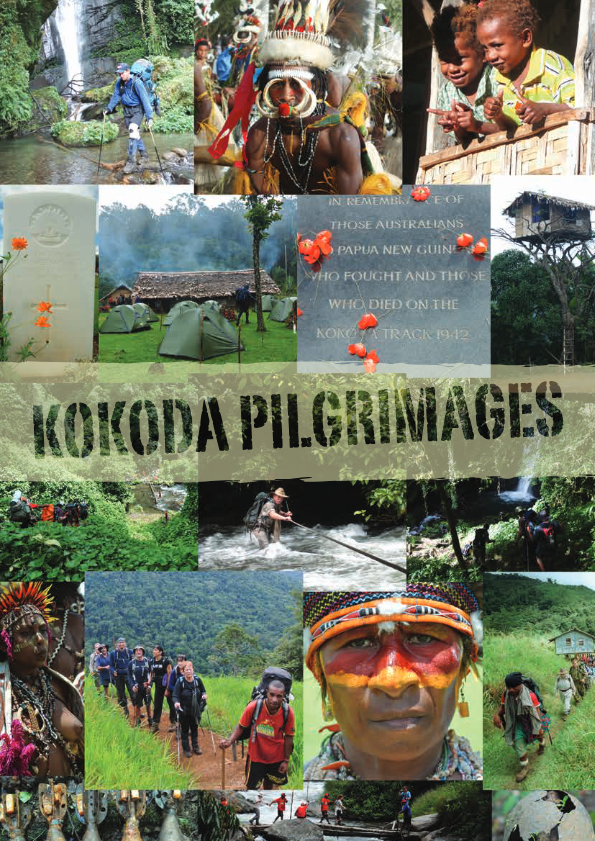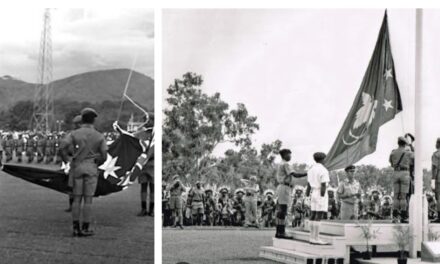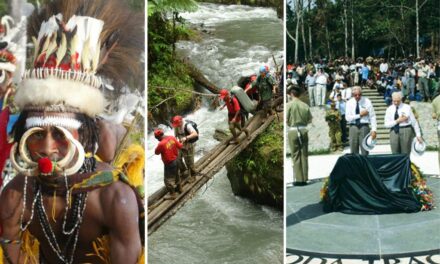This content has been archived. It may no longer be relevant
In the lead-up to the 50th anniversary of ‘Independence’ PNG is now the only country in the world which allows its most popular tourism destination to be managed as an environment park controlled by foreign aid-funded environment officials, consultants, anthropologists, archeologists, and social engineers rather than as a tourism enterprise for the economic benefit of its own traditional landowner communities!
Kokoda tourism was created by individual entrepreneurs who took a risk to invest in the potential of the emerging trekking industry after the 50th anniversary of the Kokoda campaign in 1992 – it was not created by Government which showed no interest in the pilgrimage over the previous 50 years!
Contrary to popular belief in PNG, Australians are not queuing up to trek across the Kokoda Trail because they have other options that are cheaper, safer, cleaner, and more reliable including neighbouring Bali, Fiji, New Zealand, New Caledonia, and French Polynesia who attract millions of tourists each year while PNG only gets a few thousand.
It is therefore left to smaller family-sized companies to invest in the marketing and management of treks across the Kokoda Trail and accept the risks involved in trying to do business in what is now the most corrupt country in APEC.
Corruption and government ineptitude are the primary reasons major international travel companies shun PNG and focus on other adventure tourism destinations such as Mt Kilimanjaro, Everest Base Camp, Machu Picchu, Patagonia, Gallipoli and the Western Front which attract millions of adventure tourists while PNGs most popular tourism destination, the Kokoda Trail, attracts just over three thousand.
Canberra has not helped – since they took control of the PNG Kokoda Track Authority (KTA) 15 years ago trekker numbers have plumetted by 42 percent despite a significant increase in staff and a multi-million-dollar aid budget!
Under normal circumstances an administrator would be appointed to stem the slide and manage the industry while authorities investigated the reason for such a dramatic fall in patronage.
An administrator would seek to understand why the KTA, which operates under the auspices of Canberra’s aid-funded ‘Kokoda Initiative’, refuses to publish newsletters, financial reports, or even answer emails – and why It operates as an unaccountable government agency which has no expertise in commercial management, military heritage, or pilgrimage tourism.
Nobody knows what they do or where the money they collect for trek permits goes because they have never published an annual financial report which leads to well-founded suspicions of corruption – their website, which has not been updated for 12 years, is irrelevant.
Those with extensive experience in international tourism believe the Kokoda Trail has the potential to be a high-value, world-class pilgrimage tourism destination capable of providing a sustainable economic future for its traditional landowner communities.
They are also aware that the job of government is to develop infrastructure, develop policy, and create rules to encourage private enterprise to invest with manageable risk – these costs are inevitably recovered through the imposition of taxation which allows for further public investment.
The dramatic fall in trekker numbers is because PNG has allowed Kokoda tourism to be captured by shrewed foreign bureaucrats who know how to use ‘aid-for-influence‘ to enlist the support of political grifters in PNG to support their ideological agenda which is not related to pilgrimage tourism across the Kokoda Trail. This is evident in their failure to invest in the identification, restoration and interpretation of a single battle site across the entire 138 km Kokoda Trail since they took control of it 15 years ago, in 2009.
In the lead-up to the 50th anniversary of ‘Independence’ PNG is now the only country in the world which allows its most popular tourism destination to be managed as an environment park controlled by foreign aid-funded environment officials, consultants, anthropologists, archeologists, and social engineers rather than as a tourism enterprise for the economic benefit of its own traditional landowner communities!
The recent illegal blockade unexpecadly exposed their agenda and their dismal management record!
The solution now is for PNG to break the cycle of aid-dependency by transferring responsibility for the Kokoda Trail from ‘environment’ to ‘tourism’ and appointing a professional Board with expertise in commercial management rather than cronies who will continue to fight over the diminishing spoils of their most popular tourism destination at the expense of village communities across the Trail.

In the lead-up to the 50th Anniversary of Independence next year the PNG Government should seek to break the cycle of foreign contol by using the provisions of their Lands Act to acquire the gazetted area of their Kokoda Trail, which extends to 10 metres either side of the route between Owers Corner and Kokoda, as a national tourism asset to avoid any future threats from the inflence of foreign officials; rogue Port Moresby based landowners; and local grifters who spend most of their time trying to syphon off trek permit fee income and aid-funds for their own benefit.
But even then, it’s going to take a long time to recover from the recent illegal blockade which has led to PNG now being regarded as an unreliable tourism destination for international tourists.
LINKS FOR FURTHER READING:
- Kokoda Blockade – A catalyst for change!
- A Chronicle of our Kokoda Journey: 1991-2024
- Papua New Guinea- A Place of Pilgrimage
- A Marketing Strategy for Kokoda Pilgrimage Tourism
- Proposed Joint Understanding for the Commemoration of the Shared Wartime Heritage between PNG and Australia
- Proposal for Kokoda Day
- Proposal for Kokoda Scholarships
- Funding Proposal for a Military Heritage Master Plan
- Template for Village-Based Workshops on the Kokoda Trail







A couple of questions for you Philip:
• Before I led my first group across the Kokoda Trail in 1992 there was no management system in place and your villagers earned absolutely nothing from it–absolutely nothing!
• After a few treks where I witnessed the plight of your villagers I lobbied for the establishment of a ‘management body’ with Sir Peter Barter in 2003, and then advanced K25,000 to make it happen! Kokoda tourism has since generated more than K200 million for your village communities across the Trail-I would have thought you would have been pleased with the opportunities we created for you and your people.
• In addition to this I have established two charitable foundations which have raised more than K3 million in charitable donations to enable us to build community learning centres for your people; a TB Isolation Ward at Popondetta Hospital; a Fish Farm at Ioribaiwa High School; market gardens at Sogeri National High School; scholarship programs for your students; etc. etc. – prior to this your people received no external support.
• I have also generated more positive publicity for PNG than all other Kokoda tour operators combined – that’s a matter of record!
• I was the first Australian politician to lobby for the inclusion of PNG workers into the Pacific seasonal workers program – that’s a matter of record!
• I was also the first Australian politician to host your Grand Chief and Prime Minister, the late Sir Michael Somare, at our New South Wales Parliament – I also hosted your Consul-General, Mr Sumasy Singin, and numerous delegations from PNG in our NSW Parliament over many years, all at my own expense – that’s a matter of record!
• I never proposed to ‘buy 10 meters either side of the Kokoda Trail’ as you allege. Your own government legislated this in 1972 – you need to do some homework and check your facts!
• Your own government has legislated the name ‘Kokoda Trail’ – I can’t understand why you insist on using Australia’s adopted name ‘Kokoda Track’-I can’t understand why you don’t support your Government’s sovereign right to name their own geographic features. There is no official record of the name ‘Kokoda Track’ in PNG or Australia.
• I have measured the distance of the Trail many times over the past 20 years with a modern Garmin GPS – the distance I recorded is 138 km – I’m not sure how many times you have measured it but I would be interested to know where you got the figure ’96 km’ from because it is clearly wrong.
• Your assertion that the fall in trekker number was due to an aircraft accident in 2008 is pure BS! We have never had a query in this regard for more than 20 years – and during this time we have used charter aircraft on more than 200 occasions to fly directly into Kokoda without incident.
• I cannot be held to account for the ‘negligence of the PNG Government’ regarding the compensation payment for the Kodu landowners as you allege.
• In February this year you sent me the following FB message: ‘Brother Charlie Lynn, I hope you will recognize this memory. Alex Rama is the first guide for Adventure Kokoda and Charlie’s right-hand man. Both parents are dead. Daughter completed grade 12 and is currently in Port Moresby looking for livelihood. Can you support this child Samantha Alex Rama until she finds a way out of where she is now’.
• I took note of your request and contacted Alex’s daughter. We are now sponsoring her diploma studies at a private business college. We will continue to provide whatever support we can to help her–a couple of days ago she advised me that she is enjoying her studies and will send me her results early in the New Year–what else do you expect me to do Philp?
• If you check the records of the Investment Promotion Authority (IPA) you will find that our company, Adventure Kokoda, is the only Australian Kokoda Tour Company to have fully complied with their Act, and the only one to have met our taxation obligations in PNG!
• You mention ‘Kokoda Spirit’ as a model Australian company – I would suggest you check them out on this blog: https://blog.kokodatreks.com/2024/09/01/wayne-wetherall-kokoda-spirit-alert/ to see if they align with PNGs assertion of being a Christian nation!
Philip, I have spent 99% of my time living in your villages across the Kokoda Trail, and I have nothing but the highest admiration for your people. I know you also want the best for them but attacking the messenger is not going to do them any favours.
A couple of days ago, George Batia, sent me the following message:
‘THANK YOU Taubada Charlie for reminding us of the significant of Kokoda Day and the the history of the Fuzzy Wuzzy Angels during the WW2 along the Kokoda Track.
‘Your continuous support to advocate developments along the corridors of Kokoda Track is important.
‘CEO of KTA, Mr Jack Deia has raised concern for a rural police station to be built at Efogi village and I hope all stakeholders support this important project for police to deliver the tourism policing concept in partnership with local and international tour guide companies for the safety and security for all people that set foot on this historic track.
‘Thank you!
‘GN. Batia’
Is George Batia related to you Philip?
Well done Charlie! I’m delighted by your well argued case in response to Phillip Batia’s ‘off the cuff’ remarks. Is he a person of influence, or a landowner with years of walking the Trail?
Has the Kokoda Trail been formally reopened yet? Does Adventure Kokoda need a hand sorting out people, places and gear? Let me know, if so. Regards, Reg Yates
Adventure Kokoda has provided more charitable support to villagers across the Kokoda Trail than all other tour companies combinded – we are very proud of this achievement which can be checked out on this link:
https://blog.kokodatreks.com/2024/02/13/network-kokoda-honouring-their-legacy-along-the-trail